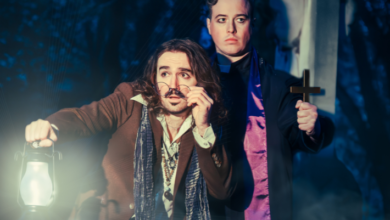Review: Tonight Will Be a Memory Too, The Playground Theatre
An honest and heartbreaking portrayal of the effects of neurodegenerative disease on a marriage.summary
Rating
Excellent
Single location, two-character plays can be hard to crack. Even the challenge of keeping an audience engaged in the story can feel momentous. Fortunately, director John Davey has broken this one wide open.
Old-married-couple Geoff and Jill face up to the reality of their lives in an emotional 3am encounter: the air is heavy, their communication is strained, and the conversation moves in circles. Ideas double back on themselves, questions skip ahead, and thoughts disappear down new pathways as Geoff grapples to communicate through the disorganisation gripping his mind. In a fight for understanding, the pair hold each other captive, trapped in an endless tumble of confusion, love, anger, and forgiveness, neither able to simply go back to bed.
Gordon Clark, clad throughout the play in a pink women’s dressing gown, cuts a striking image as Geoff, an old man slowly succumbing to a degenerative brain disease. He questions “Which one is it? Mad or ridiculous?” As the challenges Geoff and Jill (capably played by Lisa Day) have faced together in their lives begin to bubble to the surface, the couple look as if they may finally float apart. Yet, despite her obvious discontentment, Jill – a woman tired of fighting but refusing to back down – insists “I chose you and I chose this.” Both Clark and Day deftly deliver naturalistic performances that combine effectively to create a relationship that feels both real and well-worn. Together the pair skillfully crack open the door to the deep emotional well of a marriage that has long ceased to be an equal partnership.
Indeed, this demanding level of naturalism appears to be the key to Andrew McGuinness’ script. As the lines twist and turn the actors must assimilate into their curves or risk ruining the delicately crafted honesty his work offers to his audience. This essential naturalism is also wonderfully complemented by Gavin Jones’ delicate sound design, which blends seamlessly into the background, only coming to the audience’s attention when called into focus by Geoff and Jill’s agitated back and forth. Similarly, Ray Dunning’s homely yet chaotic set design creates a complete (if at times mildly prescriptive) world for McGuinness’s characters to exist within. Andrew Whadcoat’s lighting and Jenny Webb’s costume design also contribute effectively to the world of the play.
An honest and heartbreaking portrayal of the effects of neurodegenerative disease on a marriage, Tonight Will Be a Memory Too draws its audience into the tragic cycle of forgotten memories and repeated conversations, refusing to set us free from the all-too-human reality that so many of us may one day face. In this new play McGuinness brings us a heart‑wrenching testament to promises made and promises kept, as he explores the cost of choosing to stay when someone you love is fading away.
Written by: Andrew McGuinness
Directed by: John Davey
Set design by: Ray Dunning
Lighting design by: Andrew Whadcoat
Sound design by: Gavin Jones
Wardrobe by: Jenny Webb
Tonight Will Be a Memory Too runs at The Playground Theatre until Saturday 3 June. Further information and bookings can be found here.







